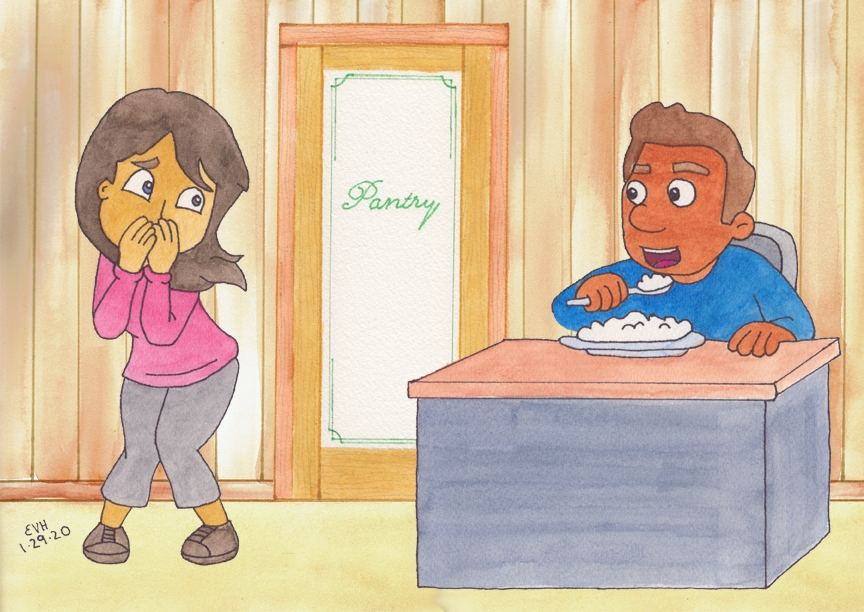
Jataka 212
Ucchiṭṭha Bhatta Jātaka
The Leftover Rice
as told by Eric Van Horn
originally translated by William Henry Denham Rouse, Cambridge University
originally edited by Professor Edward Byles Cowell, Cambridge University
This is another story about infidelity. One thing that I have always liked about the Buddhist literature is that it is quite grounded. It is very human. It reads like an inventory of human experience.
This story is partly about wanting, a core teaching of the Buddha. It is wanting that is at the root of our stress and suffering. There is something about the human mind that likes to want. It is addictive behavior. And the mind gets sucked into the wanting more than it does the actual object of our desire. Ṭhānnisaro Bhikkhu uses this example. He says, “If I told you that you can’t have pizza today, that would not be much of a problem. If I told you that you can’t think about pizza today, that would be much harder.” And as is often the case, in this story a monk wants something that is actually bad for him.
“Hot at top.” This story was told by the Master while he was at Jetavana. It is about one who longed for a lost wife. The monk in question was asked by the Master if he really was lovesick. Yes, he said, so he was. “For whom?” was the next question. “For my late wife.” “Brother,” the Master said, “this same woman was wicked in former days and made you eat the leftovers of her lover.” Then he told this story of the past.
Once upon a time, when Brahmadatta was reigning in Benares, the Bodhisatta was born into a family of poor acrobats who lived by begging. So when he grew up, he was needy and squalid, and he lived by begging.
There was at the time in a certain village of Kāsi a brahmin whose wife was bad and wicked. And it so happened that the brahmin went abroad one day on some business, and her lover used this opportunity to visit the house. After she received him, he said, “I will eat something before I go.” So she prepared the food, serving up hot rice with sauce and curry. She gave it him, bidding him to eat, while she stood at the door watching for the brahmin. And while the lover was eating, the Bodhisatta stood nearby hoping for a handout.
At just that moment the brahmin set about for home. His wife saw him drawing near and ran quickly into the house. “Up, my husband is coming!” and she made her lover go down into the storeroom. The husband arrived, and she gave him a seat and water for washing his hands. On top of the cold rice that was left by her lover she dished out some hot rice and set it down in front of him. He put his hand into the rice and felt that it was hot above and cold below. “This must be someone else’s leftovers,” he thought, and so he asked the woman about it in the words of the first stanza:
“Hot at top and cold at bottom, not alike it seems to be,
I would ask you for the reason, come, my lady, answer me!”

Figure: “Hot at top and cold at bottom!”
Again and again he asked, but she was afraid that her deed would be discovered, so she held her peace. Then a thought came into our tumbler’s mind. “The man down in the storeroom must be a lover, and this is the master of the house. The wife says nothing for fear that her misdeed will be discovered. So! I will describe what is going on and show the brahmin that a man is hidden in his pantry!” And he told him the whole story, how that when he had gone out from his house, another man had arrived and had done evil, how he had eaten the first rice, that the wife had stood by the door to watch the road, and how the other man had been hidden in the storeroom. And in so saying, he repeated the second stanza:
“I am a tumbler, sir, I came on begging here intent.
He that you seek is hiding in the storeroom, where he went!”
The tumbler dragged the man out of the storeroom by his top-knot and told him not to do anything like that ever again, and then he departed. The brahmin rebuked and beat them both and gave them such a lesson that they were not likely to do this ever again. Afterwards he passed away to fare according to his karma.
When the Master had ended his discourse, he taught the Four Noble Truths at the conclusion of which the lovesick monk attained stream-entry. Then the Master identified the birth, “Your late wife was then the brahmin’s lady. You, the lovesick monk, were the brahmin, and I was the tumbler.”
